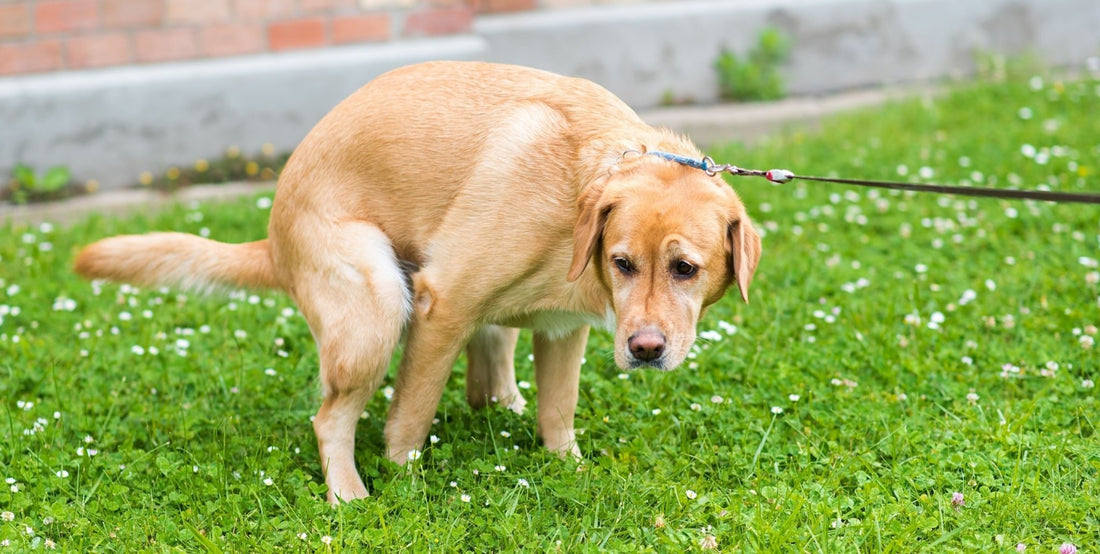
What You Need to Know About Colitis in Your Pets
Share
We know that feeling of dread when you realize your pup has come down with chronic diarrhea, or even worse, you find mucus or blood in his stool. These are some symptoms of colitis, or inflammation of your dog’s large intestine or colon. Other symptoms include a frequent and urgent need to use the bathroom. In these cases, it’s of the utmost importance that you take your pet to the vet immediately, as dehydration and weakness can quickly occur.
But when your vet diagnoses your fur-baby with colitis, what do you do? If you’re anything like us at Homescape Pets, you’ll want to first consider all the safe and natural remedies before having to rely on pharmaceuticals. Let us help you! But first, let’s take a closer look at what colitis is and what causes it.

What Causes Colitis in Cats and Dogs
Also known as ulcerative colitis, colitis is one of two forms of inflammatory bowel disease (IBD). Colitis has to do with the lining of your pet’s colon. If your dog or cat has IBD, his or her immune system will mistake food and other materials in their gastrointestinal tract for unwanted foreign substances. To combat this, their immune system will send white blood cells down to the bowls, causing chronic inflammation and colitis.
Other causes of colitis include:
- Irritable Bowel Syndrome (IBS) that is not unlike IBS in humans. Different from Inflammatory Bowel Disease, IBS is often stress-related.
- Parasitic infections like hookworms, whipworms, or giardia.
- Bacterial infection, like salmonella.
- Pancreatitis caused by inflammation of the pancreas.
- Food allergies or intolerance
If this all seems scary to you, rest assured that most dogs and cats diagnosed with colitis tend toward a speedy and healthy recovery. Additionally, the most common causes of colitis actually have to do with food intolerance or stress (sudden or acute colitis), meaning treating this condition may not always have to involve complex (and expensive) pharmaceuticals.
Dietary Options for Treating Ulcerative Colitis in Pets
Because food intolerance is so commonly the cause of colitis, you may want to start with an elimination diet. Elimination diets help identify what the source of your pet’s food intolerance and allergy may be.
Many holistic veterinarians also recommend a grain-free diet to help pets suffering from colitis or sensitive tummies. That’s because grain is usually the culprit in causing negative reactions, especially in kibble that is high in grain content, or if grains are highly processed.
Here are other natural treatments for colitis:
Digestive Enzymes
Look for a good quality probiotic like acidophilus or lactobacillus to help your pup absorb all the nutrients in his food.
Plain Yogurt with Live Cultures
Known as the “good bacteria” for dogs, plain yogurt, or even kefir, is a popular choice as a remedy for dogs. Kefir, especially, is packed with probiotics and also contains beneficial yeasts.
Foods and Herbs Containing Omega-3 Fatty Acids
Omega 3 fatty acids have anti-inflammatory properties, making it the obvious supplement for inflammatory conditions in pets! Some herbs that are helpful for colitis include:
- Slippery Elm - Provides starches and components of tannin that can offer some astringency and can also help move fluids and foods through his intestines. (We swear by this one in our household!)
- Marshmallow Root - Chock-full of mucilage that helps nourish your pup’s intestinal lining and provide a protective layer between his inflamed membranes and food substances
- Plantain Leaf - Much like marshmallow root, plantain is also rich with antioxidant chlorophyll, vitamins, minerals, and fiber, all of which are essential to healing.
- Licorice Root (Glycyrhizza glabra) - Well known to be a powerful anti-inflammatory and immune system booster, licorice root can also help speed up the healing process.
If you’re interested in more, check out our blog post, “Natural Herbs that are Safe for Cats and Dogs, and remember: always consult your vet before administering your own remedies, even herbs!
Colitis can be quite painful for pets, which is always heartbreaking to witness. Not only can they not communicate with you, but they can’t even really understand what’s happening inside their gut. Fortunately, we have supplements that can help him feel more comfortable. Calming Relief can help calm discomfort due to colitis, and it also supports healthy digestion and immunity… everything your pet needs for a speedy recovery!
